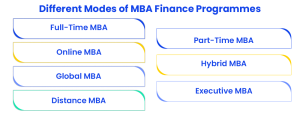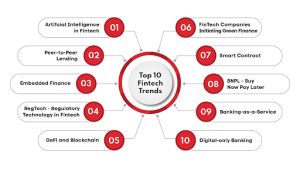MBA in Finance: Scope, Careers, Salary & Benefits

Table Of Content
- The Growing Relevance of an MBA in Finance
- Industry Trends in Finance (Future Outlook)
- Scope, Careers & Benefits of MBA in Finance
- Who Should Consider MBA in Finance?
The Growing Relevance of an MBA in Finance

Have you ever wondered why so many ambitious professionals choose finance as their specialization in management? Whether you’re a graduate deciding your next step, a working professional eyeing leadership roles, or someone considering a career shift, the question often arises: How can I stay competitive in today’s evolving business environment?
With rapid globalization, digital transformation, and increasing complexities in the financial world, there is a growing need for experts who can manage capital, assess risks, and shape investment strategies. Finance remains the backbone of every business, influencing decisions that impact growth, profitability, and long-term sustainability.
This is where an MBA in Finance becomes a transformative career choice. Beyond equipping professionals with theoretical knowledge, it offers practical tools to navigate corporate finance, banking, investments, and emerging fields like fintech. For anyone looking to upskill, diversify their career options, or move into high-impact roles, this degree has proven to be a robust investment in the future.
In this blog, we’ll explore the scope, career paths, benefits, and salaries linked to an MBA in Finance, while also highlighting how Jaro Education can support you in taking this important step.
Industry Trends in Finance (Future Outlook)

The finance sector is undergoing rapid transformation, driven by technology, regulatory changes, and evolving consumer expectations. Professionals entering the field today need to be prepared not just for current roles but also for emerging trends that will shape the next decade.
- Fintech & Digital Banking: From mobile wallets to AI-driven lending platforms, digital finance is revolutionizing how money is managed and transferred.
- Artificial Intelligence & Data Analytics: Predictive analytics and AI models are now used for fraud detection, risk assessment, and investment planning.
- Blockchain & Cryptocurrencies: Decentralized finance (DeFi) and blockchain applications are opening new avenues for transparency and security.
- Sustainable Finance & ESG Investing: Investors and companies are increasingly focused on environmental, social, and governance criteria, making green finance a rapidly growing field.
- Globalization of Capital Markets: With cross-border mergers, foreign direct investment, and international trade growth, finance professionals must understand global market dynamics.
By aligning with these trends, an MBA in Finance ensures learners remain future-ready, adaptable, and in demand across industries.
Scope, Careers & Benefits of MBA in Finance

Who Should Consider MBA in Finance?
- Fresh Graduates: For those completing undergraduate degrees in commerce, economics, business, or even technical fields, this program provides a direct gateway into high-growth finance careers.
- Early to Mid-Level Professionals: Individuals with 2–8 years of work experience in fields like operations, consulting, or IT who want to pivot toward leadership roles in finance and strategy.
- Career Switchers: Professionals from non-finance backgrounds (e.g., engineers, analysts, entrepreneurs) who want to transition into roles like investment banking, corporate finance, or risk management.
- Entrepreneurs & Business Owners: Those running businesses can use financial expertise to make better decisions regarding investments, capital allocation, and long-term growth.
This makes the MBA in Finance not just a degree but a strategic choice for anyone seeking professional reinvention, leadership growth, or financial expertise.
How Jaro Education Helps You Pursue MBA in Finance
The Value of Networking in Finance Careers
- Peer Learning: Classrooms bring together learners from diverse professional backgrounds, offering cross-industry perspectives and collaboration opportunities.
- Alumni Networks: Access to graduates working in top firms helps learners understand real-world challenges and explore hidden job opportunities.
- Industry Exposure: Through webinars, guest lectures, and live projects, students interact with seasoned professionals, opening doors to mentorship and partnerships.
- Recruiter Relationships: While MBA programs do not guarantee placements, strong industry ties often create pathways to internships and project-based opportunities.
For finance professionals, where trust, credibility, and referrals often influence success, these networks can make a decisive difference in securing leadership roles or international opportunities.
Why Now is the Right Time for an MBA in Finance
In a world where businesses are continuously adapting to new economic realities, finance remains at the heart of every strategic decision. An MBA in Finance not only enhances your knowledge but also prepares you for leadership roles in industries that thrive on financial expertise.
If you are asking yourself, “What is MBA in Finance, and how can it transform my career?”—the answer lies in aligning your education with the right opportunities. Choosing the right program and mentorship can make a lasting difference.
With Jaro Education’s counseling, curated programs, and industry partnerships, you gain a trusted guide in navigating this journey. Whether you aim for corporate leadership, investment banking, or fintech innovation, the next step begins with informed learning choices.
Frequently Asked Questions
Yes. Programs are designed with flexible learning models such as online sessions and recorded lectures, making them suitable for working professionals.
An MBA in Finance equips you with versatile skills applicable across industries. While no program can guarantee placement, the knowledge, exposure, and career guidance offered by Jaro can support your transition into sectors such as banking, consulting, fintech, or corporate strategy.
Find a Program made just for YOU
We'll help you find the right fit for your solution. Let's get you connected with the perfect solution.

Is Your Upskilling Effort worth it?

Are Your Skills Meeting Job Demands?

Experience Lifelong Learning and Connect with Like-minded Professionals

